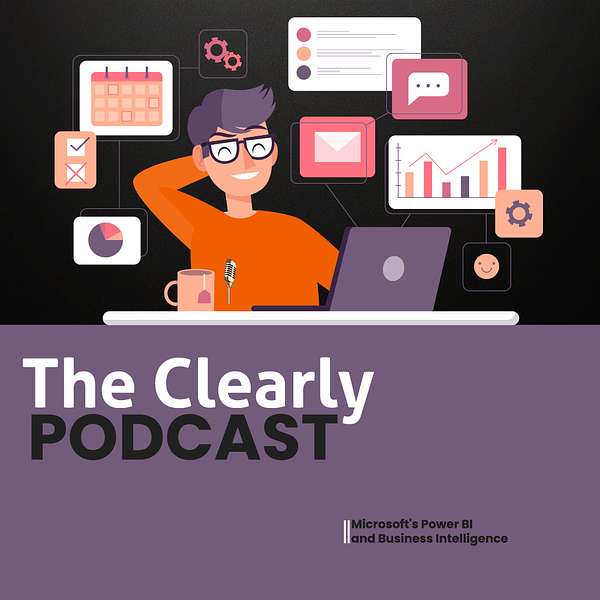
The Clearly Podcast
The Clearly Podcast
Fabric Has Gone GA
Use Left/Right to seek, Home/End to jump to start or end. Hold shift to jump forward or backward.
The podcast discusses Fabric’s recent move to General Availability (GA) following its announcement at Microsoft Ignite. GA status means Fabric is now a fully released product, ensuring stability and predictability for production use.
The discussion then moves to pricing, detailing the different SKUs ranging from F2 to F2048. Prices vary by region, with significant savings available for those who choose to reserve capacity. Power BI licensing is included starting at F64, making it a cost-effective option for organizations that require both Fabric and Power BI.
Storage costs for Fabric are additional but competitively priced at around £20 per terabyte per month.
The podcast highlights that Fabric is suitable for both SMBs and larger enterprises, with lower SKUs fitting well within the SMB market. The flexibility in capacity units across different workloads is emphasized.
For those starting with Fabric, it’s advised to assess data sizes, sources, and movement frequency, using existing Azure calculators for sizing. When considering a proof of concept (POC), it’s recommended to start with a small instance and choose a dataset that showcases Fabric’s capabilities beyond what Power BI alone can do.
The podcast concludes by noting that existing Power BI premium capacities now support all Fabric workloads, making it a valuable addition for current Power BI users. The hosts express excitement for the next week’s surprise topic and thank their listeners.
You can download Power BI Desktop from here.
If you already use Power BI, or are considering it, we strongly recommend you join your local Power BI user group here.
To find out more about our services and the help we can offer, contact us at one of the websites below:
UK and Europe: https://www.clearlycloudy.co.uk/
North America: https://clearlysolutions.net/
Andy:
Today's topic is that Fabric has gone GA. We discussed Fabric a few weeks ago, so check our previous podcasts for detailed views. Today, we focus on the main points: What GA means, pricing from F2 to F2048, capacity units, the significance of F64, reservation pricing, storage, who Fabric is for, and sizing and POCs. Tom, let's start with what GA means.
Tom:
GA stands for general availability. This means Fabric is no longer in preview; it's a fully released product. Microsoft is now limited in making changes without prior notice to customers, ensuring it’s safe for production use.
Andy:
Great, thanks. Let's discuss pricing. Shailan, can you give an overview of how Fabric pricing works?
Shailan:
Sure. Fabric has different SKUs, from F2 to F2048. Prices vary by region. For example, in the UK, an F2 costs £252.46/month pay-as-you-go, but reserving it drops the price to £150.13/month, offering a 41% saving. Reservation usually means committing for a year, but longer periods might be offered in the future.
Andy:
Thanks. Could you explain Power BI licensing in relation to Fabric?
Shailan:
Power BI licensing is included starting at F64. For instance, an F64 costs £8,071.72/month as pay-as-you-go. This includes Power BI, making it a cost-effective option compared to buying Power BI separately.
Andy:
That’s interesting. What about storage costs?
Shailan:
Storage is additional. Fabric’s storage pricing is very reasonable, about £20/month per terabyte, making it very competitive.
Andy:
Considering the wide price range, where do you think Fabric fits in terms of market?
Tom:
Fabric fits well within the SMB market at lower SKUs, offering flexibility across different workloads. Smaller businesses might only need Power BI, but medium-sized enterprises can benefit from Fabric’s broader capabilities.
Andy:
What advice do you have for someone starting with Fabric in terms of sizing?
Shailan:
Assess data sizes, data sources, and the frequency of data movement. Use existing Azure calculators for pipeline sizing and storage. It’s important to determine the data you actually need to bring across to avoid unnecessary costs.
Andy:
What guidance would you give for a POC?
Tom:
Start with a small instance, like an F2, and choose a dataset that highlights Fabric’s features beyond what Power BI alone can do. This allows you to fully explore and benefit from Fabric’s capabilities.
Andy:
Great advice. Thank you both. As we wrap up, remember that Fabric’s components have been around for a while, so there’s no need to worry about stability.
Shailan:
Exactly. And if you already have a Power BI premium capacity, Fabric supports all its workloads, making it a valuable addition.
Andy:
That’s excellent to know. Thank you for the insights. We’re out of time, but we appreciate our listeners tuning in. Next week will be a surprise topic, possibly with a guest speaker. Goodbye!
Tom:
Thanks, goodbye.
Shailan:
Thanks, see you next time. Goodbye.